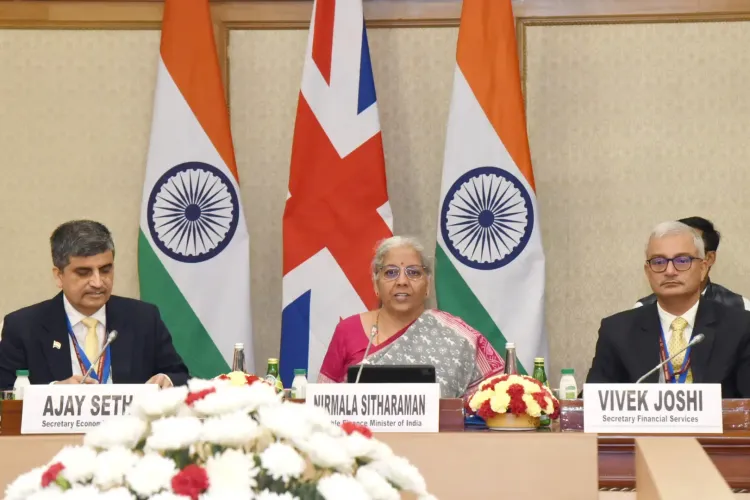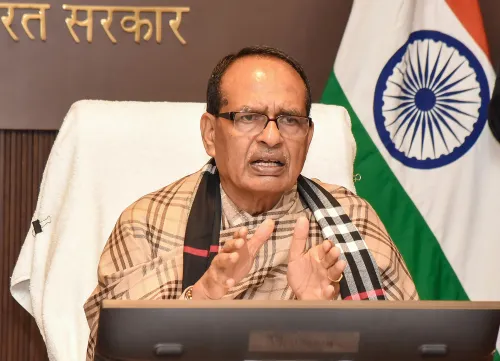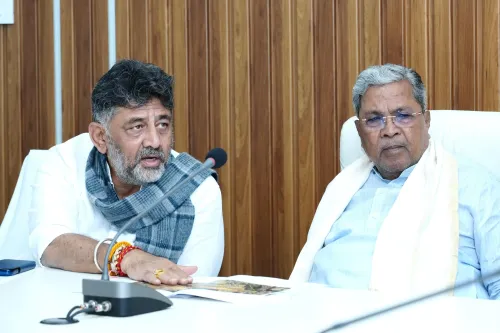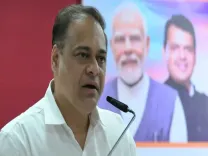Finance Minister Sitharaman's Upcoming London Visit to Strengthen India-UK Economic Relations

Synopsis
Key Takeaways
- Nirmala Sitharaman will visit London next week.
- Focus on bilateral trade and investment discussions.
- Meetings under the India-UK Economic and Financial Dialogue.
- Resumption of Free Trade Agreement negotiations.
- Trade between India and the UK increased by 34.2%.
New Delhi, March 31 (NationPress) Finance Minister Nirmala Sitharaman is set to embark on a visit to London next week, from April 8-10, where she will engage in discussions concerning bilateral trade and investment, as well as participate in talks under the India-United Kingdom Economic and Financial Dialogue.
During her visit, Sitharaman is expected to meet with her UK counterpart, Chancellor Rachel Reeves. The India-UK Economic and Financial Dialogue serves as a vital institutional framework aimed at enhancing trade and investment between the two nations.
A senior official indicated that they may address topics related to the trade agreement and the bilateral investment treaty during their discussions.
This bilateral cooperation on economic and commercial matters is structured through institutionalized dialogues designed to boost trade and investment. Regular meetings are held to assess the progress of these initiatives, including the Economic and Financial Dialogue (EDF).
Piyush Goyal, the Minister of Commerce & Industry, announced on February 24 that India and the UK have agreed to resume negotiations for a Free Trade Agreement (FTA) following talks in Delhi with UK’s Jonathan Reynolds.
“All options are on the table. We are actively negotiating three interrelated aspects - the FTA, the Bilateral Investment Treaty, and a Double Contribution Convention Agreement,” he stated.
However, Goyal emphasized that India is not looking to hastily finalize a trade agreement. “We will have speed but not haste,” he remarked when questioned about a potential deadline for signing the deal.
The agreement consists of 26 chapters, covering goods, services, investments, and intellectual property rights. While the UK seeks to lower tariffs on products such as electric vehicles and Scotch whisky, India is advocating for more accessible visa regulations for its professionals in the services sector.
The India-UK EFD is a platform established to fortify the financial and economic relationship between the two countries, emphasizing areas such as sustainable development, financial reforms, and regulatory frameworks, with the objective of fostering bilateral trade and investment.
In December of last year, the third meeting of the India-UK Financial Markets Dialogue was held by the Finance Ministry in GIFT City, Gujarat.
Delegates from both nations discussed reforms within their respective financial services sectors, including capital markets, insurance & reinsurance, pensions, FinTech, and sustainable finance.
Bilateral trade between India and the UK (covering both goods and services) reached 36.3 billion pounds during the fiscal year 2022-23 (April 2022 - March 2023), reflecting a 34.2 percent increase, or 9.2 billion pounds, compared to 2021-22. India's imports from the UK totaled 14.7 billion pounds, while exports amounted to 21.6 billion pounds. India ranked as the UK's 12th largest trading partner during this timeframe, contributing 2.1 percent to the UK’s overall trade.
India has invested in 108 projects and created 7,533 new jobs in the UK, securing its status as the second-largest source of Foreign Direct Investment (FDI) after the US, according to the Department for Business and Trade (DBT) inward investment statistics for 2023-2024.
The UK stands as the 6th largest inward investor in India, following Mauritius, Singapore, the USA, the Netherlands, and Japan, with a total equity investment of $35 billion (April 2000-March 2024), representing about 5.17 percent of all foreign direct investment into India.










